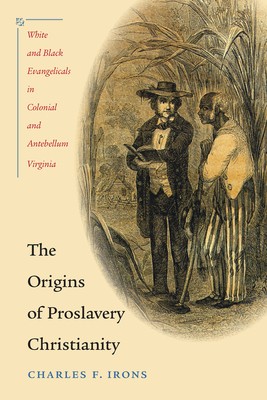
- We will send in 10–14 business days.
- Author: Charles F Irons
- Publisher: University of North Carolina Press
- ISBN-10: 0807858773
- ISBN-13: 9780807858776
- Format: 16 x 23.6 x 2.3 cm, softcover
- Language: English
- SAVE -10% with code: EXTRA
Reviews
Description
In the colonial and antebellum South, black and white evangelicals frequently prayed, sang, and worshipped together. Even though white evangelicals claimed spiritual fellowship with those of African descent, they nonetheless emerged as the most effective defenders of race-based slavery.
As Charles Irons persuasively argues, white evangelicals' ideas about slavery grew directly out of their interactions with black evangelicals. Set in Virginia, the largest slaveholding state and the hearth of the southern evangelical movement, this book draws from church records, denominational newspapers, slave narratives, and private letters and diaries to illuminate the dynamic relationship between whites and blacks within the evangelical fold. Irons reveals that when whites theorized about their moral responsibilities toward slaves, they thought first of their relationships with bondmen in their own churches. Thus, African American evangelicals inadvertently shaped the nature of the proslavery argument. When they chose which churches to join, used the procedures set up for church discipline, rejected colonization, or built quasi-independent congregations, for example, black churchgoers spurred their white coreligionists to further develop the religious defense of slavery.
EXTRA 10 % discount with code: EXTRA
The promotion ends in 6d.06:35:27
The discount code is valid when purchasing from 10 €. Discounts do not stack.
- Author: Charles F Irons
- Publisher: University of North Carolina Press
- ISBN-10: 0807858773
- ISBN-13: 9780807858776
- Format: 16 x 23.6 x 2.3 cm, softcover
- Language: English English
In the colonial and antebellum South, black and white evangelicals frequently prayed, sang, and worshipped together. Even though white evangelicals claimed spiritual fellowship with those of African descent, they nonetheless emerged as the most effective defenders of race-based slavery.
As Charles Irons persuasively argues, white evangelicals' ideas about slavery grew directly out of their interactions with black evangelicals. Set in Virginia, the largest slaveholding state and the hearth of the southern evangelical movement, this book draws from church records, denominational newspapers, slave narratives, and private letters and diaries to illuminate the dynamic relationship between whites and blacks within the evangelical fold. Irons reveals that when whites theorized about their moral responsibilities toward slaves, they thought first of their relationships with bondmen in their own churches. Thus, African American evangelicals inadvertently shaped the nature of the proslavery argument. When they chose which churches to join, used the procedures set up for church discipline, rejected colonization, or built quasi-independent congregations, for example, black churchgoers spurred their white coreligionists to further develop the religious defense of slavery.


Reviews